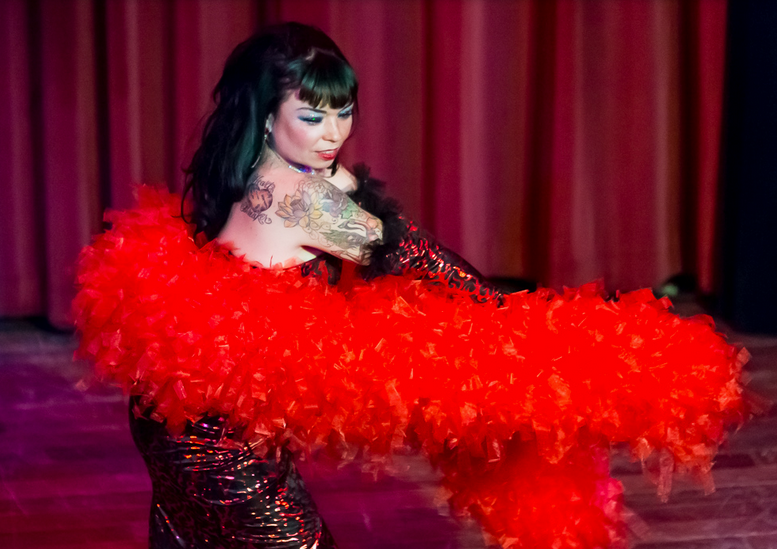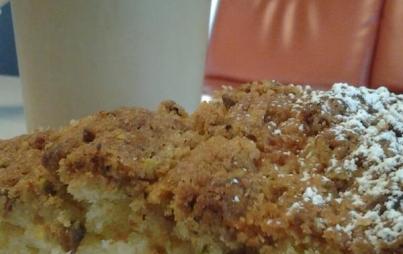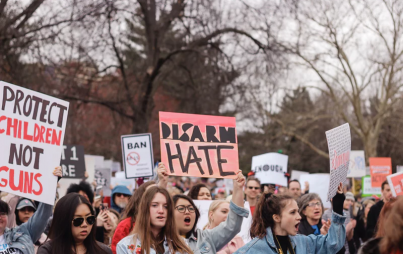
Rosa Sifuentez—AKA Bunny Pistol—isn't your average anything. Born and raised "East of East L.A." she wended her way to San Francisco at 19 and never looked back. Toggling between two careers—by day she works as an event + hair color specialist/make-up artist at Tease Salon and by night shakes it in her skivvies as the founder of Barbary Coast Burlesque—Bunny is anything but bored. A curvaceous woman with shocks of lagoon-green hair amid dark tresses and a bevy of tattoos, she feels like a neo-Bettie Page.
We met up at Bellies Cafe in Temescal Oakland to talk about this month's show, her upcoming festival in NYC, and how burlesque saved her life.

So how did this whole burlesque career get off of the ground? Why San Francisco?
San Francisco was a city I dreamed about moving to—it's very different than L.A. To me, it represented a lot of history. I loved the architecture, the weather—it felt careful, cool and artistic. [laughs.]
I went to my first burlesque show in 2002—Teaserama at Bimbo's and I said to myself, "I wanna do that! That's exactly what I need to be doing." But it took me five years to take my first class. It's such a celebration of the female body—I feel in love with it and came out of "retirement" in 2007.
When I was an actor I didn't feel like I hitting my stride—but with burlesque I immediately felt like, this is where my family of freaks are!
What's it like performing in such a female-heavy industry? Is there a ton of competition? Camaraderie?
I pride myself on my boldness and honesty and I think I often expect that too much from others—not everyone can be that way. I also tend to see people through rose-colored glasses.
The entertainment industry can be very much that way—people do what they can to get ahead. But in the burlesque and performance world the last thing on earth you want to do is take something and make it your own. They'll say, "bitch that's mine! I told you about that!"
I work in two very hustle-heavy businesses. But I try to hustle without burning people.
Different communities have different results. In the SF community, there's definite camaraderie. I welcome everybody—wave-makers and fire-starters—as long as you haven't done me wrong.
Do you ever get any push-back for your performances? How do you keep coming up with new acts to differentiate yourself?
I'm always telling saying, "we're an offensive art form." If you go into a court of law and say you're a burlesque dancer all people they hear is, "that's a girl who takes her clothes off in front of people!" So there's a very blurred, fine line here. If you're going to be offended by something a performer is doing on stage, they're probably doing it right. I basically feel like—don't be racist, and don't be an asshole.
I have this Bollywood act—I first debuted it in 2011. No one has said anything to me about it but there's definitely this weird feeling that it might be cultural re-appropriation. But it's really not. Some people didn't know how to take it or respond to it. But I'm doing the actual Bollywood dances and this supports and celebrates the culture, not appropriates it.
I feel like my act has finally been validated because I was just invited to the Asian Burlesque Spectacular in New York on May 16th —and I'm the only non-Asian performer.

What's the intersection between burlesque, drag, and transgender performers? I feel like there's a lot of dialogue between these different facets—is that a new phenomenon?
A few years ago you'd never have burlesque performers at a drag show, but you'd have drag performers at a burlesque show. Nowadays there's all kinds of integration which is amazing and awesome and beautiful. Like the dawn of faux-queens— a female performer that is performing like a man performing like a woman.
Do you consider yourself a feminist?
I'm a feminist for sure. I'm working for my I'm living—I'm not relying on a man. I do what I want, when I want, how I want to and that makes me a feminist. Everybody has their own definition. It makes me sad for women to not take a stance one way or another—but if you don't feel like voting, don't vote. [smiles and shrugs.
I think a lot of other women who consider themselves feminists would say what you do is antithetical to what many "feminists" are fighting for. In burlesque you're not only highly sexualized but there's a ton of emphasis on the artifice—on makeup, hair and costumes. How do you reconcile all that?
This is where my two businesses really integrate. Women come to me because they're not happy with the way they're looking. And there's nothing wrong with that! It's not being a phony—it's making you feel good! If you start obsessing about your looks, that's where it gets dangerous. Your average woman has a career, has a child, has bills to pay, and still wants to maintain her looks. And "looks" are usually sandwiched somewhere in there for 5-10 minutes of their day.
I talk a lot with my clients, many of whom are first-time mothers and have spent the past ten years of their life dedicated to raising them. They usually say, "oh my god I feel guilty being here!" And I say, 'why?! Because you're taking a moment for yourself?" Burlesque is about celebrating the female form and every kind of body—especially the curvy.
I like waking up in the morning—I go and make people feel pretty.
What's your latest act?
A Josephine Baker-inspired 1920's act. I dance to "That's It" by Preservation Hall Jazz Band.
Your costumes are so elaborate! Do you make them all yourself?
Oh god no. I can add snaps or fringe and re-purpose some clothing here and there, but I have a seamstress and costumer—Lauren Cohen—who's also a burlesque dancer and really gets it. She made me my special underwear to go under my Sari. I do rhinestone all my things. I grab some E-6000 adhesive, a bamboo skewer and go to town!
Check out Bunny's show—Barbary Coast Burlesque—this Sunday, April 27th at Yoshi's with Honey Mahogany at 7:30. $15/20
(Images: Red Boa, Jeff Spirer; Vanity shot, Samantha Cooper.)





![By Magicland9 [CC BY-SA 3.0 (https://creativecommons.org/licenses/by-sa/3.0)], from Wikimedia Commons By Magicland9 [CC BY-SA 3.0 (https://creativecommons.org/licenses/by-sa/3.0)], from Wikimedia Commons](/sites/default/files/styles/profile/public/images/article/2019-06/Bell.png?itok=gWp6s_Y0)
